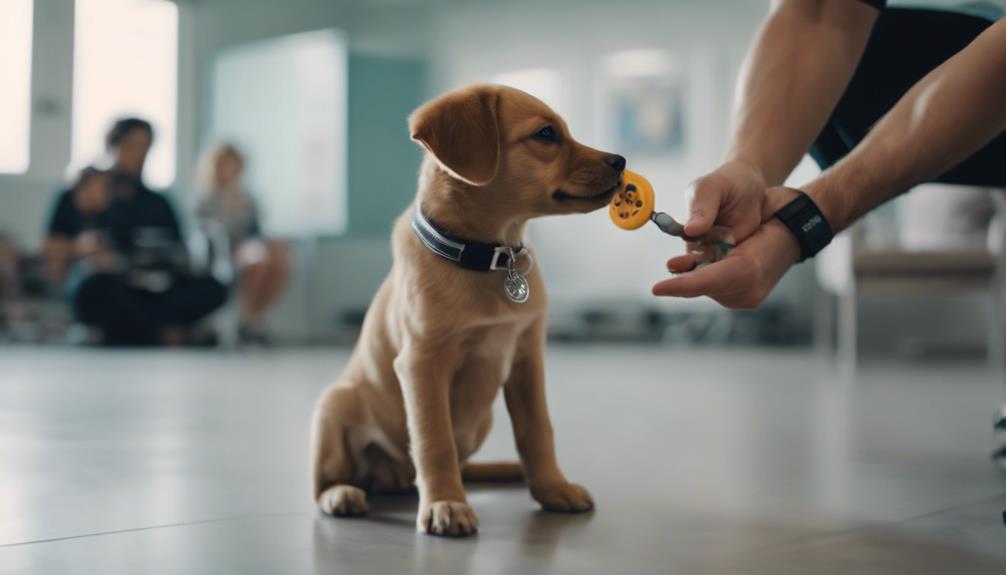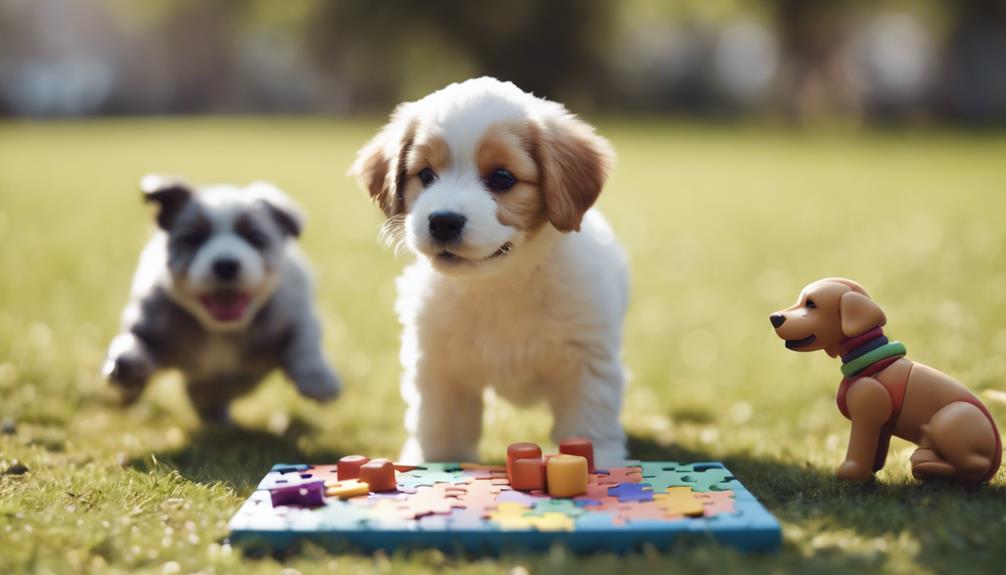As a first-time pet parent preparing to embark on the journey of puppy kindergarten, it is crucial to equip yourself with essential knowledge that can shape your puppy's learning experience and development.
From understanding the significance of early socialization to navigating the dynamics of a class environment, there are key aspects to consider before diving into this educational phase with your furry companion.
By exploring these fundamental elements, you can lay a solid foundation for a successful training journey and set your puppy up for a harmonious relationship with you and the world around them.
Key Takeaways
- Choose a trainer who uses positive reinforcement for effective and enjoyable learning.
- Prepare your puppy for kindergarten by introducing new experiences and positive interactions.
- Attend classes to understand training techniques, care needs, and how to respond to behaviors.
- Socialize your puppy, engage in physical and mental exercise, and seek professional guidance for behavioral issues.
Trainer's Teaching Style Matters
When embarking on the journey of puppy kindergarten, the choice of a dog trainer becomes paramount as their teaching style significantly influences the learning experience. Trainers employing positive reinforcement methods create a conducive environment for effective learning.
It is crucial to research and select instructors who prioritize positive reinforcement techniques, as this approach fosters quicker understanding and retention of training concepts. A trainer's ability to communicate clearly, provide constructive feedback, and tailor teaching methods to suit individual puppies greatly impacts the success of the training program.
Early Socialization Is Key
Early socialization is vital for a puppy's development and well-being, establishing the groundwork for lifelong positive behavior and interactions. This process is key in helping puppies grow into well-adjusted and self-assured pets, as it involves exposing them to different environments, individuals, and animals during crucial developmental phases. By doing so, future problems related to fear or aggression can be effectively mitigated.
Benefits of Early Socialization:
- Fosters confidence and diminishes fear
- Promotes positive relationships with both humans and other animals
- Aids in averting behavioral issues in later stages of life
Understanding Training Essentials

To effectively navigate the training process for your puppy, understanding the essential components of training is paramount for fostering a harmonious relationship and promoting positive behavior development. Attending puppy kindergarten provides valuable insights into dog body language, care needs, and appropriate responses to various behaviors.
Bringing high-value treats can enhance focus during training sessions, while reducing your puppy's food intake before class can improve attention. Learning about positive reinforcement techniques and establishing clear rules and boundaries are crucial for effective training.
Consistency in training methods, patience, and the use of cues over commands contribute to faster learning. By grasping these training essentials, you set the foundation for a well-behaved and happy puppy.
Class Environment and Preparation
Understanding the significance of creating a conducive class environment and adequately preparing your puppy for their kindergarten experience is essential for successful training outcomes.
When getting ready for puppy kindergarten, consider the following:
- Class Environment:
- Potty accidents are common but manageable.
- Trainers are equipped to handle accidents.
- Playtime at the beginning of class helps release energy.
Ensuring a positive and supportive environment in the classroom can set the stage for effective learning and socialization for your puppy. By being prepared for common occurrences and facilitating a welcoming atmosphere, both you and your puppy can make the most out of the kindergarten experience.
Importance of Socialization

Prioritizing socialization is crucial for fostering well-rounded behavior in puppies. Early exposure to various environments, people, and animals helps puppies develop social skills and confidence. Positive interactions during this critical period can prevent fear and aggression issues later in life.
It is essential to introduce your puppy to different situations gradually, ensuring that each experience is positive and enjoyable. Encourage interactions with other well-behaved puppies to promote good social behavior. Supervise playtime to prevent negative encounters and always respect other pet parents' boundaries.
Effective Training Techniques
When delving into effective training techniques for puppies, it is essential to establish a strong foundation built on positive reinforcement and clear communication. Utilizing methods that focus on encouragement and consistency can lead to successful learning outcomes for your furry companion. Here are some key points to consider:
- Positive Reinforcement: Reward good behavior to reinforce desired actions.
- Consistency: Implement training routines regularly to maintain progress.
- Clear Communication: Use cues and commands effectively to convey expectations.
Balancing Physical and Mental Exercise

To ensure a well-rounded development for your puppy, it is crucial to strike a harmonious balance between physical activity and mental stimulation. Regular play sessions are essential for physical exercise, helping to keep your puppy healthy and active.
Additionally, providing interactive toys can offer mental stimulation, keeping your puppy engaged and preventing boredom. Incorporating training into daily activities not only exercises your puppy's mind but also reinforces learning.
This balance of physical and mental exercise is key to preventing behavioral issues and fostering a strong bond with your puppy. Quality time spent engaging in various activities will not only benefit your puppy's overall well-being but also strengthen your relationship through shared experiences.
Seeking Professional Guidance
For pet owners seeking expert advice on addressing behavioral concerns or refining training techniques, consulting with a professional trainer is highly recommended. Professional trainers can provide valuable insights and guidance tailored to your puppy's specific needs. Here are some key reasons why seeking professional guidance is beneficial:
- Specialized Knowledge: Trainers have expertise in understanding dog behavior and can offer tailored solutions.
- Structured Learning: Training classes provide a structured environment for effective learning.
- Early Intervention: Addressing behavioral issues early can prevent long-term problems and promote a harmonious relationship with your pet.
Setting Expectations and Environment

Establishing clear training expectations and fostering a positive learning environment are crucial for nurturing your puppy's development during puppy kindergarten.
It's important to understand that perfection in training takes time, so avoid pressuring your dog and stay calm for better learning outcomes. Set realistic goals to track training progress effectively.
Creating a positive and nurturing atmosphere during training sessions can significantly impact your puppy's learning experience. By reducing stress and maintaining a calm demeanor, you can enhance the teaching and learning process.
Consistent Homework and Practice
Maintaining consistent homework assignments and practicing the learned training concepts at home are essential components for reinforcing your puppy's development during puppy kindergarten. It is crucial to continue the training outside of class to ensure lasting results. To achieve success, consider the following:
- Schedule daily training sessions to reinforce class teachings.
- Use positive reinforcement techniques consistently to encourage desired behaviors.
- Keep a training journal to track progress and identify areas needing improvement.
Conclusion
In conclusion, first-time pet parents embarking on the journey of puppy kindergarten should prioritize understanding training essentials, seeking professional guidance, and creating a conducive learning environment for their furry companions.
Consistency, socialization, and balancing physical and mental exercise are crucial components in fostering a well-rounded and well-behaved pet.
By incorporating these key elements into their approach, pet parents can set their puppies on the path to success and strengthen the bond between human and canine.




